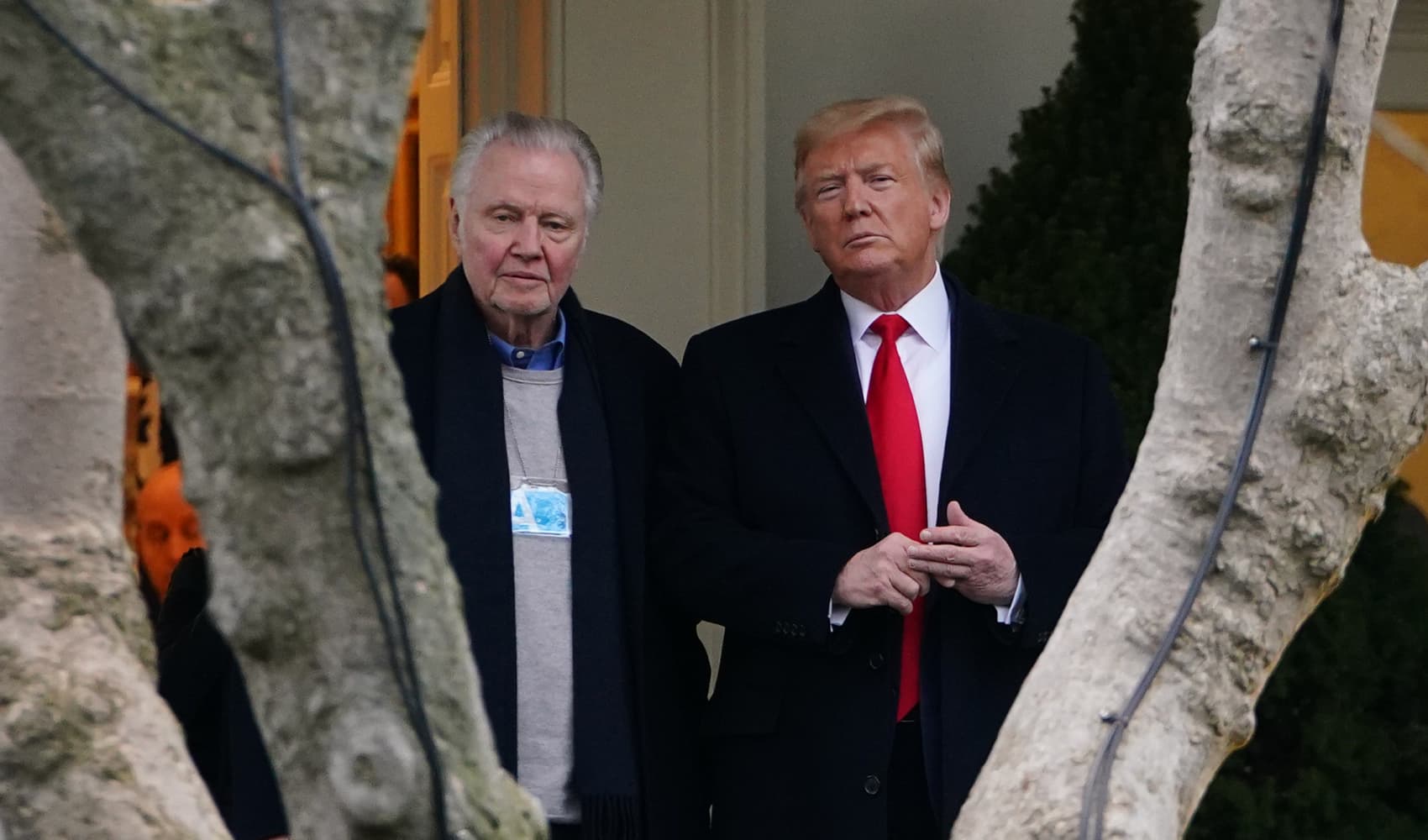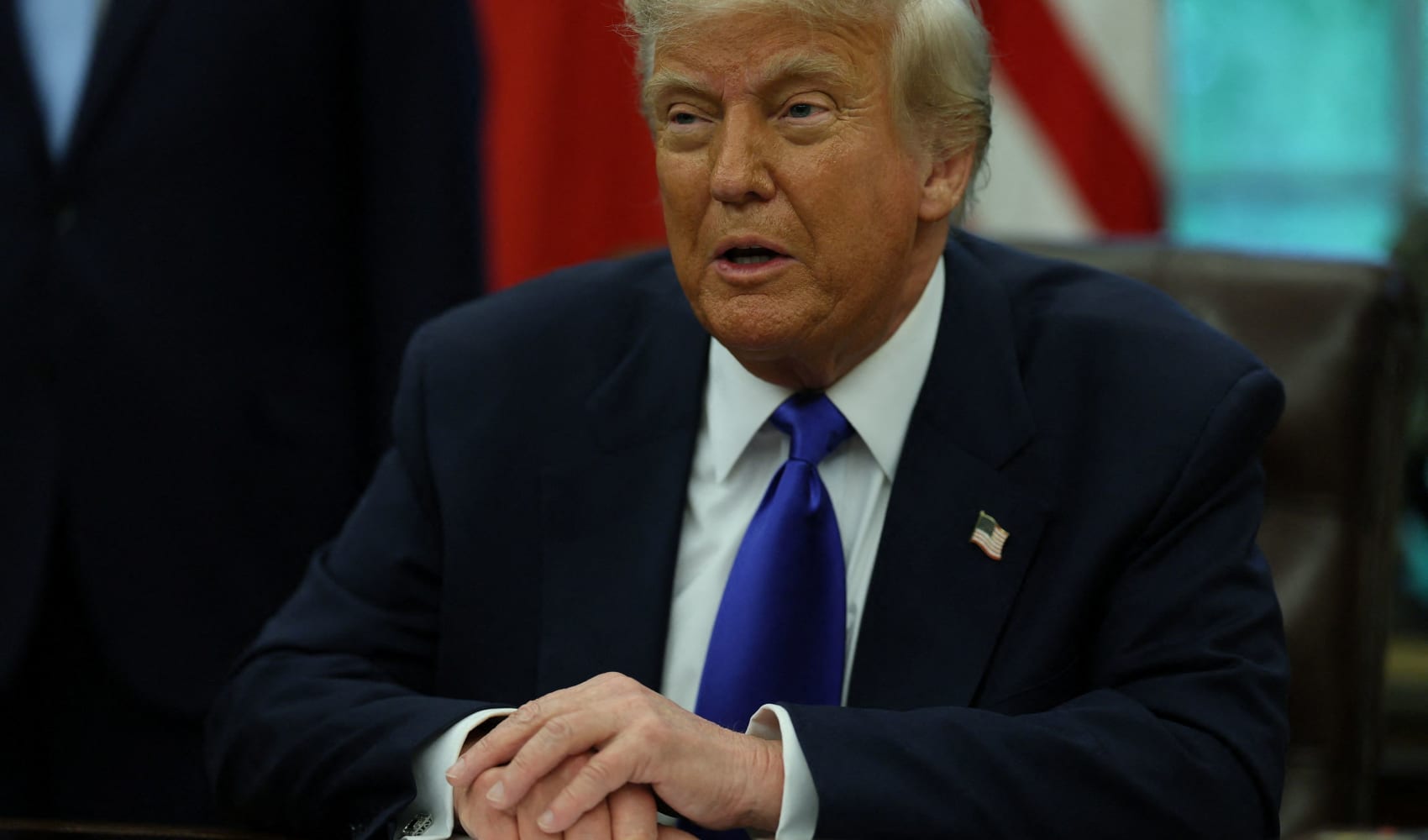Hollywood Tariff: Trump, Voight Meeting Sparks Debate!
Lights, Camera, Tariffs? Trump's Hollywood Shake-Up and the Voight Connection
Introduction: The Plot Thickens in Hollywood
Hold onto your popcorn, folks! The world of Hollywood just got a whole lot more…taxing. In a move that's leaving Tinseltown both buzzing and bewildered, former President Donald Trump floated the idea of imposing a whopping 100% tariff on foreign-made films. But the story doesn't end there. It seems this surprising proposal might have its roots in a meeting between Trump, actor Jon Voight, and Voight's manager. What exactly went down behind those closed doors? Let's dive into the details and explore this unfolding drama.
Hollywood Meets Washington: The Voight Visit
So, what prompted this sudden interest in tariffs on foreign films? It all seemingly started with a visit. Actor Jon Voight, a known supporter of Donald Trump, and his manager met with the then-president to discuss ways to bolster the domestic film industry. While details are still emerging, it's believed that they presented a proposal that included, among other things, the idea of using tariffs to incentivize film production here in the good ol' US of A.
A Proposal from the Stars
While the exact specifics of Voight and his manager's proposal remain under wraps, the core concept was clear: find a way to make it more attractive for studios to film movies in the United States. This isn't a new concern, of course. Many have argued that tax incentives in other countries lure productions away from Hollywood, costing American jobs and impacting the local economy. Was this the problem they were trying to address?
Trump's Tariff Bombshell: 100% on Foreign Films!
Fast forward to the weekend, and BAM! President Trump announces that he's instructing the Commerce Department and the U.S. Trade Representative to explore implementing a 100% tariff on "any and all Movies coming into our Country that are produced in For..." The announcement, delivered via social media (of course), sent shockwaves through Hollywood. Imagine the price of that imported indie film you've been dying to see skyrocketing overnight!
The Ripple Effect: Who Feels the Pinch?
Who would be affected by such a drastic measure? Well, pretty much everyone involved in importing foreign films. From major studios distributing international blockbusters to independent theaters showcasing art-house cinema, the potential impact is massive. Even streaming services that rely on content filmed abroad would feel the squeeze.
Hollywood's Reaction: Shock and Confusion
The response from Hollywood was, predictably, a mix of shock and confusion. Industry executives, producers, and actors scrambled to understand the implications of such a tariff. Was this a serious policy proposal or simply a negotiating tactic? Would it actually help the American film industry, or would it simply cripple the flow of creative content?
A Collective Gasp
The sheer scale of the proposed tariff – 100%! – was enough to make even the most seasoned Hollywood veteran gasp. It's one thing to discuss leveling the playing field, but doubling the cost of importing foreign films seemed like a nuclear option. The industry waited with bated breath, wondering if this was a fleeting idea or a sign of things to come.
Trump's Reassurance: "I Want to Help the Industry"
Amid the uproar, President Trump attempted to clarify his intentions. "I'm not looking to hurt the industry, I want to help the industry," he declared on Monday. But the question remained: how exactly would a 100% tariff on foreign films achieve that goal?
A Helping Hand or a Heavy Hammer?
Is this policy similar to giving the film industry a helping hand, or is it a heavy hammer that will leave everyone in the industry with significant injuries? Trump's words offered a glimmer of hope, but the specifics remained murky. Was this a strategy to pressure foreign governments into offering better deals for American filmmakers? Or was it a genuine effort to protect domestic jobs and boost the U.S. economy?
The Economic Argument: Boosting Domestic Production
The core argument behind the tariff proposal is that it would incentivize film production within the United States. By making foreign films significantly more expensive, the thinking goes, studios would be more likely to invest in projects filmed on American soil, creating jobs and stimulating the economy. This approach is meant to create a favorable economy for American companies, but there are valid arguments against its use.
A Level Playing Field?
Proponents of the tariff argue that it would level the playing field, addressing the unfair advantages that other countries offer through tax breaks and subsidies. This could potentially attract more foreign investment as well.
The Potential Downsides: Limiting Creative Freedom and Choice
However, there are also significant downsides to consider. A 100% tariff could drastically limit the availability of foreign films in the U.S., reducing creative diversity and limiting consumer choice. Imagine a world where you can only watch American-made movies. That's the potential reality under this policy.
The Risk of Retaliation
Furthermore, such a tariff could provoke retaliatory measures from other countries, leading to a trade war that would harm the entire film industry. Other countries may feel inclined to implement a similar policy towards the United States.
Jon Voight's Perspective: A Patriot's Vision?
Given his involvement in the initial proposal, it's reasonable to assume that Jon Voight believes the tariff would ultimately benefit the American film industry. Perhaps he envisions a resurgence of Hollywood as a global filmmaking powerhouse, creating countless opportunities for actors, writers, directors, and crew members.
Standing Up for American Jobs
Voight may view the tariff as a way to protect American jobs and ensure that the country remains a leader in the entertainment industry. After all, he is a part of the entertainment industry.
The Manager's Role: Strategizing for Success
While Jon Voight's star power may have opened doors, his manager likely played a crucial role in crafting the specific policy proposals and presenting them to President Trump. Managers are often responsible for navigating the complex world of Hollywood and advocating for their clients' interests.
A Business-Savvy Approach
The manager's involvement suggests that the tariff proposal was not simply a matter of personal opinion but a carefully considered strategy aimed at achieving specific economic goals.
The Future of Hollywood: A Wait-and-See Game
For now, the future of Hollywood remains uncertain. Whether the proposed tariff will actually be implemented, and what impact it will have on the film industry, remains to be seen. One thing is certain: the conversation has begun, and Hollywood is paying close attention.
A Story Still Unfolding
This is a story still unfolding, with many twists and turns yet to come. Stay tuned for further developments as Hollywood and Washington continue to grapple with this complex and controversial issue.
Conclusion: A Tariff Tale with Unclear Consequences
So, where does this leave us? A Hollywood legend, Jon Voight, and his manager met with former President Trump. A 100% tariff on foreign films was proposed. Hollywood responded with confusion and concern. The potential benefits and drawbacks are hotly debated. Ultimately, the future of this proposal, and its potential impact on the film industry, remains to be seen. One thing's for sure: this is a story that will continue to captivate audiences both on and off the screen.
Frequently Asked Questions
- What exactly is a tariff? A tariff is essentially a tax imposed on imported goods or services. In this case, it would be a tax on films produced outside the United States.
- Why would anyone propose a 100% tariff? The goal is to make foreign films significantly more expensive, theoretically encouraging studios to film more movies in the US and support the domestic film industry.
- Would this tariff affect streaming services like Netflix and Amazon Prime? Yes, if these platforms import movies or shows filmed overseas, the tariff could increase their costs.
- Is this the first time someone has suggested tariffs on movies? While specific proposals vary, discussions about protecting the American film industry and leveling the playing field with foreign incentives have been ongoing for years.
- What are the chances this tariff will actually be implemented? It's difficult to say definitively. Political and economic factors will influence the decision. Public opinion and the potential for retaliation from other countries would also play a role.

